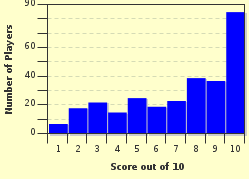Quiz Answer Key and Fun Facts
1. Which of the five stars in the Southern Cross constellation are usually not so easily visible to the naked eye or by using binoculars?
2. To locate south by means of the south celestial pole, you make use of the Southern Cross together with two other bright stars commonly known as what?
3. Which two stars in the Alpha Centauri system orbit each other?
4. South of the 34 degree latitude, the Southern Cross is visible all-year round, never dipping below the horizon. What is such a constellation called when it can always be seen?
5. Close to the Southern Cross, there is another cross-shaped constellation. Because it can be mistaken for the Southern Cross, it is commonly known as what?
6. What is the name of the dark nebula close to Alpha and Beta Crucis?
7. What is the common name for Open Starcluster NGC 4755 seen close to the Southern Cross?
8. What type of stellar phenomenon is Omega Centauri?
9. In 1843 the star Eta Carinae appeared to explode into a supernova. It ejected a giant bubble of gas. In what nebula within the greater Carinae nebula is the star found?
10. Many countries in the Southern Hemisphere feature the Southern Cross on their national flags. Name one exception.
Source: Author
sterretjie101
This quiz was reviewed by FunTrivia editor
crisw before going online.
Any errors found in FunTrivia content are routinely corrected through our feedback system.

